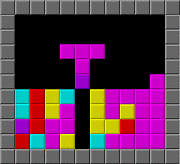|
TheGreatEvilKing posted:The skill challenge is an attempt to slap something mechanical into an out of combat scenario - which, given that this is D&D 5e, is doomed to questionable mechanics and tears. I'm not sure official publications use the term skill challenge anywhere honestly, but those never worked very well in 4e either due to Mike Mearls' bad math skills, so I'm assuming this is some homebrew skill challenge dealie where you need either X successes in Y rounds or X successes before Z failures. Given that, it literally doesn't matter what the hell happens in the fiction because 5e's skill system is poorly defined and allows poo poo like "Batman Utility Belt proficiency". It's best used as a collaborative storytelling prompt (as the other posters have stated) and quite frankly I don't see a difference between "I use Athletics to move the log I just made up" and "my 200 page backstory is about how I was raised by a group of monks who picked locks as a mental exercise to get closer to God, so I should be able to use my Religion skill to open this lock". The latter is tacitly encouraged by 5e including randomly switching your ability scores for skill checks if you can convince the DM it's appropriate, so go nuts! It's a D&D game, not a masterpiece of writing. You're sure as hell not creating great prose as an untrained actor ad-libbing with your friends, the plot can change in 5 minutes because the PCs did something you didn't expect, characterization is ever-mutable as the DM needs surprise antagonists or whatever, and ultimately it's a collaborative story so you can't really go into it expecting a full 3 act structure with a set of recurring themes that create some kind of allegory because you have 5 people with very different ideas of where the story is going to go. Heck, the game even has characters pull new abilities out of their collective asses every time they level up, and if we're taking verisimilitude I find it less likely that a wizard would suddenly become a swordmaster than a strong dude finding a log in the road. It's all a game of ad libs to make people who focused on skills feel good about their life choices, don't sweat it too much. This is probably the best reply to anything I've had to say. Because yes, if I were to nitpick that stupid log, why not nitpick the rest of the game? edit: Saying that, because we're not actors or writers, therefore we shouldn't bother to attempt to do well I think misses the point. Nobody's comparing D&D to great works of literature (and that's an absurdly high bar), but that shouldn't mean we shouldn't try to make a cohesive or comprehensive story, yes? It'd be like saying "I'm not a professional basketball player, so why bother with the rules when we go play a pickup game." Trivia fucked around with this message at 09:55 on Jan 15, 2021 |
|
|
|

|
| # ? May 31, 2024 10:49 |
|
Trivia posted:It's basically the difference between a deus-ex-machina and Chekhov's gun. If someone fires a gun where none once existed, ppl will say "where'd that gun come from?" or "how convenient that he just happened to have one." But if you set up its existence first, none of those issues arise. For me personally, seeing that sort of thing happen takes me right out of the moment. So, for example, if I was in a game you were playing, and I landed the killing blow on say an ogre or whatever, and described some cool fighting move and said "My brother taught me that trick, back home"... that you would be taken right out of the moment and would be internally going "What brother? there was no mention of a brother! He just made that up just then!"? Trivia posted:Then say that. Don't say curtains when what you really want is "something to hide behind." Or ask the DM "what's in this room? Can you describe it to us? Now all players can react to the objects in the room and also use them. That's what I said. The player should say "I want to hide behind the curtains, using my curtain hiding ability". Trivia posted:The player could also say "I overturn a table to use as cover." when there was no table before. Well, that's fine I guess, but what's to stop them from willing a table into existence in every conceivable room, or attempting to do so? Other than "Not being an rear end in a top hat." That's where it can get "gamey," and the distinction between action / reaction is important imo. What do you mean "when there was no table before"? You understand that there's no actual table, right? It's all made up. As soon as you mention a table, the table has always been there in the scene. It doesn't in-fiction pop into existence when you say "there's a table". This doesn't change based on who said "a table". Now, it's starting to be pretty obvious that you don't understand "don't be an rear end in a top hat", but are you really gonna pretend that players who aren't being assholes are conjuring tables into existence in rowboats, on top of icy mountains, in forests, and so on? Trivia posted:I wouldn't necessarily want to say no, just the option to. Trivia posted:but asking first gives them an out. This really all comes down to you wanting players to ask your permission, doesn't it? Elector_Nerdlingen fucked around with this message at 10:08 on Jan 15, 2021 |
|
|
|
Elector_Nerdlingen posted:So, for example, if I was in a game you were playing, and I landed the killing blow on say an ogre or whatever, and described some cool fighting move and said "My brother taught me that trick, back home"... that you would be taken right out of the moment and would be internally going "What brother? there was no mention of a brother! He just made that up just then!"? If a player said that I'd ask them later to update their character backstory and add a brother. Man, a lot of you like to add the "this is a made up, imaginary game" as some sort of trump card. Obviously it's made up. What I'm getting at is if you allow characters to create things whole cloth, what's to stop them from doing that all the time and just being super video gamey, trying to min-max everything all the time? Using the table example, does it make sense for a table to be in that room? I mean, sure you can put one in at any time for any reason, but if players know they can do that then what's to stop them from running into every room, declaring there's a table, turning it over and having +2 to AC all the time? As for the permission snipe, you're trying to paint me as this iron handed totalitarian. What I'm saying, and coming back full circle to my original post, is that players inventing problems to solutions they already have is not inventive or clever. It's gamey, for lack of a better word. In my opinion it seems more satisfying if players are presented a problem AND THEN have to solve it; and super satisfying if they do so in a novel way.
|
|
|
|
Trivia posted:what's to stop them from doing that all the time and just being super video gamey, trying to min-max everything all the time? you
|
|
|
|
Trivia posted:As for the permission snipe, you're trying to paint me as this iron handed totalitarian. Trivia posted:if you allow characters to Your whole thrust is "If I don't stop them from playing wrong, who will?"
|
|
|
|
Well obviously. But then you're telling players no all the time, which isn't fun for anyone. But if you the DM sets the scene and the players work within that, and in moments of brilliance they think outside the box and do something amazing with a limited toolset, that can make for great memories without breaking verisimilitude. Like I said, I think Problem > Solution as a rule is better than Solution > Problem.
|
|
|
|
Trivia posted:The DM took great pains to describe the current weather and time (early morning, roughly 9 am). i get you on this one buddy i dunno why everybody is getting tore up over how you play every group got a different way of doing it and if you are craving verisimilitude in travel then i am hoping this was communicated in clear terms to the DM, who if you are taking great pains to denigrate in this thread or feel unsatisfied with their performance, perhaps this feedback ought be brought up to them to reinforce your desires to be challenged but not come up with the challenge you solve yourself also if you are interested in giving your dm some pointers this isn't strictly D&D but have them look at gurps dungeon fantasy book 2 pages 2 thru 14, because they have very clear direction on how to use what kinds of skills when and why and their outcomes for applied travel and dungeoneering. useful in d&d as well my eyes honestly glazed over at other posts in the last two or three pages but if nobody has told you that if you demand a higher degree of logic and external challenges that your gm puts in front of you and you have not communicated this to said gm as quality honest feedback then i imagine it would be difficult to expect that to be a speedbump that won't be improved upon and just leave a sour taste in everybodys mouth e; reread and saw you did talk to gm but it did not sound productive for the outcome, so recommendation would follow to give people a reminder on what a skill challenge is and work with your dm behind the scenes so that if they plan to use it again there is a clear framework that has 'situation, identification of problem, skill pick, task resolution, move on to next skill challenge' since the specific beef is that the skill pick happened before the identification of the problem, and also that the id'ing of the problem was invented by the player aldantefax fucked around with this message at 10:58 on Jan 15, 2021 |
|
|
|
i would just sleep on it and provide the feedback and also context and bring other players into the same level of understanding since it's their first go at it, essentially, and review how that went from their perspective
|
|
|
|
Thanks for the info, I'll take a look. My DM is a good friend and I would never "dump" on him in person or on front of the group. Hence the safety of this forum. Also keep in mind that I may come across as harsh on him but I'm very grateful he's DMing and did a dynamite job all around. Maybe that's just a weakness of using text as a medium of communication. I also talked to him about it in private as well. We all generally tend to self police anyway, asking questions of the DM for clarification as well as help adjudicate rules via committee of sorts. He was receptive and himself said it felt weird. He's gonna mess with it and try again.
|
|
|
|
And yeah, it seems like a big issue is that SCs are a 4e feature crammed into 5e. I think though that it can be made to work, but needs tweaking. I WANT to like them, I think they have potential. I was hoping for a discussion on how to make them better but it kinda ran away from me and now it's insinuated that I'm some kind of control-freak who doesn't want others to have fun.
|
|
|
change my name posted:You need to buy Tasha's wholesale to get Optional Class Features as an option, btw. I picked it up cheap in the character creator bundle last week but there is no piecemeal option for it
|
|
|
|
|
People are comfortable with different levels of player world-building. It's worth bearing in mind that these can become very difficult for GMs, though. For example, considering the "hide in hanging fabrics" skill - it's problematic in itself, because it's situational and the player has spent some character investment on it, while another player might have spent equivalent investment on (let's say) "tough" which is always relevant. So allowing the player to come up with an excuse why hanging fabric is present actually resolves the issue - the GM doesn't have to made a judgment call on how often hanging fabrics must appear for the skill to be balanced, and the player can't protest about how often they get or do not get to use their skill, because if even they can't think of some reason there'd be hanging fabrics around, what grounds for complaining can they have? Likewise, "isn't it kind of weird that Brian Greenstrider just happened to know about the exact creatures the players met". The problem is, the alternative is that the players meet Brian and he tells them about some creatures, and then the PCs never turn out to meet those creatures, which is unsatisfying both in terms of the story and in terms of game balance since the players had no effective systemic reward for having met Brian. That said, I fully understand wanting at least the impression of a pre-existing world - it's a powerful thing. But denying it isn't necessarily asking for unnecessary gaming.
|
|
|
|
Oh absolutely. As anyone who has ever played a videogame, you eventually learn what is the "best" build is. I'd want to avoid that and encourage players to experiment, especially if it's chosen skills. Giving opportunities to use those skills is totes cool. If the player prompts the DM, that's fine. But maybe he says no. That's a far cry than letting the player claim curtains everywhere he can. It's the hammer and nail problem. I would say that simply knowing B.G. is enough to allow a roll on a creature, and the result is either him not mentioning it, getting it wrong, saying a little, or saying a lot. But naturally everyone can play how they want, whatever is fun.
|
|
|
|
Trivia posted:That's a far cry than letting the player claim curtains everywhere he can. Lol
|
|
|
|
Honestly that would be so ridiculous I'd probably allow it anyway.
|
|
|
|
I'm going to be kind of blanket replying to a bunch of stuff here and I don't want to go cut and paste everythingTrivia posted:Saying that, because we're not actors or writers, therefore we shouldn't bother to attempt to do well I think misses the point. Nobody's comparing D&D to great works of literature (and that's an absurdly high bar), but that shouldn't mean we shouldn't try to make a cohesive or comprehensive story, yes? And maybe Brian Greenstrider's establishing scene IS this person saying "Oh, Brian Greenstrider told me about owlbears" (followed by adivce that is either correct or extremely wrong). Maybe this turns into a running theme of this character constantly asserting Brian Greenstrider's authority in certain matters. Then we meet Brian Greenstrider in person, and the GM asks what he looks like, and the player describes Brian Greenstrider. Why is the player describing him? Because his relationship with Brian Greenstrider is a component of his character, and this is how we learn that he's either a great judge of character and Brian Greenstrider is everything he's said, or has been fanboying an incompetent local braggart, or he's never met Brian Greenstrider in his life and he's just been using him as an appeal to authority.
|
|
|
|
kingcom posted:God gently caress this is the most depressing topic the thread has come across. You're all playing the game, you're all actively talking and working with each other to tell this story. Every single one of the people at the table, whether they are playing as a player character or playing as the GM has equal levels of control of the situation. At any point a player can stand up and say 'no that doesn't happen to me' and there is not a single thing a GM can do to countermand that. The fiction and story and therefore the game and play itself is a collaborative experience by its very nature and it only functions by shared input and shared agreement. It is some really loving lovely browbeating Gygaxian pants shittery that tricks people into thinking that everyone contributing to the story is a bad thing or somehow an incorrect play experience. Trivia posted:I'm sorry this isn't more entertaining. Firstly, wtf is this poo poo, clearly you've posted on a forum before but this is real 2000's era breaking up each sentence into a different quote so you can cut all context out of what was being said and you fire off this little cutesy come backs that are incomprehensible to read back and follow. gently caress off of with that poo poo. If you want to respond to me, do it. It's real embarrassing to trying and imply the person calling you out has some emotional projection going on. What I was expressing with the first post that you then pretended I didn't infer is that consent is something that is being granted by the whole group over the play experience. It's a fundamentally collaborate experience at telling a story and playing a game. It's a lovely Gygian style of view that argues that this consent and shared experience isn't real and the actual movement behind the game you're playing. You took opposition to someone adding the most tiny of details to provide flavor to the world. The inventing of a problem and solution IS THE GAME and IS THE FUN for many people and you've told them its badwrongfun. As to your complete fail to understand the different between screenwriting 101 and a ttrpg. You're playing a story that is being written in real time, thats not anything like writing a screen play. As you a writing a screenplay you can go back and edit things, redesign motivations to better match where things are going retroactively. Add new pieces of dialogue that reference details and reinforce rules of 3 throughout your narrative, structure events and moments to better build peaks and troughs of tension. This isnt something that you can do in a ttrpg without allow the actual play to change up both the present, future and past of the narrative you're playing in. The fundamental difference between a movie and a ttrpg is a player can bring up something that has never existed and never been mentioned before, use it to their advantage and then the table can all look at each other and collectively agree that that thing has always been talked about and 'man that PC just never shut up about it and they finally got to use it!' and it becomes the objective truth of the world your pretending to operate in. You can't will reality into existence in a movie but in a ttrpg you can and you can only do so by the consent of everyone else playing. Whats baffling to me is that you kind of understand that but keep dancing around it. You keep bringing up something then when it conflicts with what you're saying you dive behind a scenario that excuses it to be not true. The scenario was that you need to head east as a prompt from the GM but there's no indication you have difficulty travelling east. You as a person and a player, not you're character or the world, have invented the idea that it's a problem even trying to work out which direction is east (something that is incredibly simple to work out if verisimilitude is your concern and is strange to need to roll for it). So you invented a solution 'find the sun' and invented a problem 'perception to find sun' that you used to contribute to the journey. This is a good thing! You added something to your story and informed everyone else about how your character solves problems, they are logical and understand how to navigate the world and plan a journey. Yet another player coming up with someone utter innocuous like 'a log fell on the path' broke that feeling for you. They also added something to the story and informed everyone at the table how their character approaches problems but inventing a problem that helps demonstrate it. There is nothing wrong with creating a roleplaying moment that then ties into a larger 'success or fail' test for the groups journey. No it really, genuinely doesn't depend on an adventure. If it's a one shot, who cares even more! Just improv left and right, go nuts, it's all going to get wiped clean at the end of the session. If its a campaign you are wanting to stick close to (something I hope you would have all talked abut as a group in your session 0 I would hope) then the GM can go 'well thats a bit outside of the adventure, lets all come up with someone together that makes a bit more sense' and provide a suggestion that's a bit closer to the module, drop it or open the floor to the whole group to brainstorm some ideas. This is all something thats possible thanks to the collective consent that goes into running the game itself. (USER WAS PUT ON PROBATION FOR THIS POST) kingcom fucked around with this message at 13:04 on Jan 15, 2021 |
|
|
|
To be clear as to why I found this topic so depressing is not because of entertainment or whatever you're seeing it is. It's that because one of the most genuinely difficult things to do with players is to get them open to the idea that they can feel comfortable with improv and coming up with ideas and features of the world to add into the narrative. I know its not everyone's first love when playing a ttrpg but for many it is and its pretty sad to see others trying to present the idea that it's somehow an invalid style of play. That its somehow a GM being lazy to provide opportunities for those types of players to express their creativity. These opportunities which are rare in a system like D&D that places all the weight on the GM to create, prep and plan everything and provides very few mechanical supports for those types of players. So when a GM takes action to provide for them and encourage them, thats a good thing.
|
|
|
|
I think part of the confusion of this discussion is exactly what you said: the DM wants to encourage this person to be less shy about roleplaying and doesn't want to strike down their first attempts to explore it, even if those attempts are bad. I'd probably clarify better RP practices later when they are more comfortable, but I would indulge their weird log moving fetishes for the time being, because it's more important that the players get involved and have fun than hammering out the terms and conditions. I don't think we have the context for how long this person had been playing or how often this was happening.
|
|
|
|
kingcom posted:Also I got some loving beef with this poo poo. What the gently caress are you talking about 'that's literally the DM's main job'. Now lets put aside the paid GM's stuff cause I've got no experience with that and don't really understand the social nature of it. 2) Fine, the DM's 'role' then. Not job. I would have thought the context of the post would have made clear I'm not talking about paid employment. 3) When I say it's the DM's job/role, I mean as defined in every iteration of the Dungeon Master's Guide for D&D and most of the Players Handbooks as well. I don't really care about other systems, if you want everyone else to do your job for you, go play Baron Munchausen. No seriously, go play it, it's collaborative storytelling of the broadest kind and you'll probably enjoy the mechanics of it. The mechanics of D&D however require the DM to be the one who creates the world and the things in it, and how they present problems for the players. 'Collaborative storytelling' is a huge field and there are many ways of doing it. D&D specifically works as a subtype where the DM controls the setting and the players control their characters. For example a DM who says to a rogue "You walk into the room and set off a trap, it does x damage" is taking control of the character in a way that the player wouldn't want - presumably the player, having chosen a rogue, would want to check for traps. That's bad DMing. The inverse of that is that players don't stray into world creation, which is what you het from "I'm on a path and there's a log blocking it" while the DM checks his phone and says 'yeah roll for it.' There are aspects of improv to it, but ultimately the rulebooks and structure make it very clear that the DM creates problems for the players to solve, and the system doesn't work the other way round. Trivia posted:The player could also say "I overturn a table to use as cover." when there was no table before. Well, that's fine I guess, but what's to stop them from willing a table into existence in every conceivable room, or attempting to do so? Other than "Not being an rear end in a top hat." That's where it can get "gamey," and the distinction between action / reaction is important imo. Part of the problem is that the player willed that thing into existence as a problem and not a solution. I'm not talking about session 0 or backstory here, I'm talking about - to use the curtains as an example - one of your players suddenly saying that they can't see because the curtains are closed. In the initial example of the log, the difference is that the player didn't say 'I find some logs and do some cool parkour poo poo over them to move faster' - that would be reacting to the world. Saying there's a log blocking the path is going against reasonable assumptions about the scenario as described. The real problem is that the DM didn't describe the scenario at all. They did pretty much zero work in getting the players from A to B. Was there a map? Was there a vague description of the topology of the area? Likely problems and encounters? If the DM had said 'you are on a path' and the player had invented the log, that'd be the player overstepping. But the DM never even described a road, or a route, or anything. It was billed as a skill check sequence, but the idea behind a skill check is that the DM presents players with a problem, and they get creative about using their skills to solve it. They don't get creative about thinking up their own problems travelling from A to B. The more I think about it the more I feel like the log example has multiple problems, and it shows that the DM didn't plan anything for that whole sequence of quest and got the players to fill in for them. It shows exactly why the DM describes and creates the world, because if you leave it to the players then what is the DM even there for? To extend the metaphor, imagine if you turned up to a game and the DM just sat back and said, start of session 1 'Ok how do you get to the boss?' And then got you all to roll for the villages you pass through, the fights you have, random loot on the bodies etc. That's not why we play D&D. We play it to be told a story by the DM. We collaborate by playing the role of characters in that story. The DM facilitates that by describing the world and the problems. If players go round creating their own descriptions and problems then again - what is the DM even for? Trivia posted:It feels like it would devolve into Calvinball at that point. The reason players don't get to make poo poo up - outside of reasonable assumptions from the DM's description - is that otherwise you end up with a gradual escalation of players making poo poo up. Like imagine if your party walks into a shop and the rogue suddenly goes crazy and murders the shopkeeper, declaring that he's the bastard who killed his father. If the player and DM had discussed that beforehand, great! If not, it could turbofuck the DM's notes about that NPC, the town, the player and what they had planned for the party to achieve. I was using an extreme example to illustrate, but in the example of the log, if later the DM wants to use a plot point about travel within that area being safe or the empire being functional, or it being an important trade route, how do you explain that a tree fell and nobody dealt with it? The butterfly effect of players making poo poo up is pretty destructive to the role of DM, but this isn't really my point as it pertains to the log. Ultimately the DM should have described the journey if they wanted something interesting to happen, or skipped it if they didn't. Because they weren't adequately controlling the narrative you end up with a situation where a new players ends up doing something - inventing things in the world - which would piss off a lot of other DMs. Bobby Deluxe fucked around with this message at 14:45 on Jan 15, 2021 |
|
|
|
i saw 96 new posts and knew there was an argument in here so hopefully this doesnít get buried any tips for running games at a high level? my dm is getting burnt out because he canít come up with challenging encounters for a party of 6 level 20 characters (but really i think he just wants to wrap up the story and be done with this campaign heís been running for three years; i just was hoping to come up with stuff to make it fun for him)
|
|
|
Declan MacManus posted:any tips for running games at a high level? my dm is getting burnt out because he can’t come up with challenging encounters for a party of 6 level 20 characters (but really i think he just wants to wrap up the story and be done with this campaign he’s been running for three years; i just was hoping to come up with stuff to make it fun for him) At that point an ancient dragon (or two) wouldn't be out of line. They'd need lair and legendary actions, though, which I know some DMs are hesitant about
|
|
|
|
|
The mechanics of D&D don't "require" that at all, and I'm having a hard time finding where it says the DM has to have strict narrative control at all times in any PHB or DMG from BECMI to 5E. I honestly don't care if it makes other DMs angry that I permit narrative agency in my game. They can die mad about it, if it does.
|
|
|
|
|
There's different ways to play the game and no two tables are going to play the game alike. You should talk to your table about what degree of narrative input from players is desired by the group. Nobody is wrong or right, there are different ways to play the game, different things that make the game fun for some but less fun for others. Just literally talk to the your group about what's most fun for everyone. At least if even you don't get your ideal style it'll be a concession to the group rather than a fold to the DM or whomever's decree.
|
|
|
|
Right, but you do see why a DM going "Make up some stuff for your characters to do for this bit guys, I'm going for a quick wank" is not exactly good DMing?
|
|
|
|
Dude, I wrote it in that way so as not to get lost in the conversation. If I just You accuse me of being "Gygian." As someone who only knows that Gary Gygax invented the game, and as someone who's been playing for 2.5 months, I don't know what the gently caress that term means. It IS a kind of projection if you label me with a term that clearly means something to the community, or yourself. I get the feeling slapfests happen a lot with D&D in general, and now I know what people mean when they say they like D&D but hate the players. Because gently caress, I wasn't trying to start a fight. It's a discussion board after all. Everyone keeps saying that I'm declaring that X is playing the game wrong, but poo poo, that finger comes right back to you with all the "no you're wrong" in return. Again, I've only started playing, and my only experience up to this point is as a DM (because nobody else wanted to do it so I said fuckit, let's begin with the Starter Set). As for the "find the sun" example, no, I didn't invent the problem. The problem was that we had to get to a location, and didn't know the lay of the land. We were given directions by the NPC who used cardinal directions in his description. The problem is already there -> We don't know what direction East is. The solution is: use the sun. Barring any weird dimensional fuckery, plus the fact that it's midmorning, you can surmise that East is towards the sun. That aligns with the road. I didn't invent the problem, I invented the solution. And yes that's not a great example because any idiot can look at the sun, you wouldn't need to roll. Now, a lot of you mention that as DM, it's hard to get players to open up. Ok cool, I've never had that problem in my ONE campaign of play. As such, you're loathe to tell players no, or shoot them down. I can totally appreciate that and it's good food for thought. Balancing the knife edge to keep them pumped about being involved, but not letting things get out of hand. Disargeria posted:It's more important that the players get involved and have fun than hammering out the terms and conditions. Exactly, which is why during play I didn't press the point. I didn't want to be THAT GUY at the table. But it stuck in the back of my mind and I wanted to talk about it. The DM really didn't do a good job of the SC, to put it bluntly. He gave us an overworld map with a path written on it, but no real descriptions from there. It's his first session as DM and aside from this small hiccup he actually did a bang up job. He saw Matt Colville's video on SCs and wanted to try, but I think he needed to do a little more work at least. Not a lot, but something to ground the experience. It could have been something like "You come to a T junction, branching left and right." Followed by "You come across a couple of travelers heading the direction you came." or "You come across a washed out section of road, it has caved and been swept away, creating a 10 foot wide by 10 feet deep chasm." Something for players to react off of. And then based upon their actions, the DM reacts to that. Around and 'round it goes. My DM implemented it like Matt Colville described, and I guess I misunderstood it when I watched the same vid. SCs sound thrilling and intense when you recall them after the fact, but in the moment (as MC explained it) it feels like people randomly stabbing in the dark. I thought trying to make them thrilling in the moment would be more fun and wondered if there were ways to go about it. All of the players and DM at my table are good friends and we're there to drink beer, eat junk food, and have a good time. Some of them are great at roleplay while others like to murderhobo. There's a good spread of playstyles. From the sounds of it, a completely open-world D&D game sounds like a loving awesome time. Especially when the DM and players riff off each other. That doesn't work as well with a module though :/ edit: I think some of you need to remember that for me (and maybe others in this thread) this is babby's first TTRPG. While some of you are old hats with years of experience and have solutions to these well worn questions, some of us aren't and may be trying to figure it out without someone to teach us. Trivia fucked around with this message at 15:13 on Jan 15, 2021 |
|
|
|
Bobby Deluxe posted:Right, but you do see why a DM going "Make up some stuff for your characters to do for this bit guys, I'm going for a quick wank" is not exactly good DMing? Anything that makes the game more fun for the players is good DMing. At one table that's going to be perfectly good DMing and at another table it's going to be bad DMing.
|
|
|
|
It's bad DMing within the definition of what DMing is, is what I'm saying.
|
|
|
|
Perry Mason Jar posted:There's different ways to play the game and no two tables are going to play the game alike. You should talk to your table about what degree of narrative input from players is desired by the group. Nobody is wrong or right, there are different ways to play the game, different things that make the game fun for some but less fun for others. Just literally talk to the your group about what's most fun for everyone. At least if even you don't get your ideal style it'll be a concession to the group rather than a fold to the DM or whomever's decree. We kinda had a brief talk about the game and what to expect, but since we're all new we didn't know about a Session 0 and discussing things like player input or things of that sort. Good to know.
|
|
|
|
FFT posted:what's the name of the game, again? yeah weíre supposed to fight the lich king but thereís no reason that vecna couldnít be a dracolich i think the lair and legendary actions donít get used enough which iíll bring up
|
|
|
|
FFT posted:what's the name of the game, again? Yeah I think that at that point it's probably good to go back to the classics. The storytelling has probably gone about as far as it can go without a reset, and the characters are so powerful that they can achieve whatever they'd like to do (and probably already have). So go back to the traditional tropes, revisit nightmarish versions of low-level scenarios, or mine heroic legends like the Twelve Labors of Hercules or the Epic of Gilgamesh.
|
|
|
|
Bobby Deluxe posted:It's bad DMing within the definition of what DMing is, is what I'm saying. I mean I'm inclined to agree. The game I'm running I'm doing spotlights since the players are generally scattered across a huge area. So I have a spotlight order and when someone's spotlight turn is up I offer them a list of quests/events to choose from. Usually 6-9 options. And I was really wanting to give the option of "none of these, you tell me!  " and the entire reason I didn't is because it felt lazy. But actually what I should do instead is ask my players how they'd feel about it and then pull or not pull the trigger based on that. I think I'll wait til everyone has been given spotlight options sans "your call" and then introduce the possibility once they have a feel for how it goes down. " and the entire reason I didn't is because it felt lazy. But actually what I should do instead is ask my players how they'd feel about it and then pull or not pull the trigger based on that. I think I'll wait til everyone has been given spotlight options sans "your call" and then introduce the possibility once they have a feel for how it goes down.Trivia posted:We kinda had a brief talk about the game and what to expect, but since we're all new we didn't know about a Session 0 and discussing things like player input or things of that sort. Good to know. It's never too late!
|
|
|
|
It's a choice, and you can make it either way. For some reason there's incredibly strong feelings on both sides. Sometimes these are positive, as both sides think that the players on the other side would enjoy their games much more given the option. Sometimes they're negative and end up escalating into flame wars for whatever reason. Games where the players contribute to the world are not invalid, but they have a distinctly different feeling. Their game balance is different, the mindset the players are in has to be different, and they feel different in play. Essentially, it trades off some of the feeling that "you are your character" for the character having more opportunities to do and encounter cool stuff and a more flexible world. The game can be more engaging, but less immersive. If you reject that tradeoff, it's not really a problem.
|
|
|
|
I think the collaborative storytelling is great and adds flavor and involvement. It really helps flesh out characters. "There's a rockslide and my brawny barbarian pushes everything out of the way to get our wagon past" It just gets weird to me when you bring dice into it, because then it introduces the possibility of failure. I mean sure that can lead to some fun emergent gameplay, but I have brainworms from playing mostly dnd for the majority of my experience. The hang up is on "the dm introduces challenges" maybe? Idk
|
|
|
|
Trivia posted:It's his first session as DM and aside from this small hiccup he actually did a bang up job. Oh, then I think there were way too many words written about this situation.
|
|
|
|
Trivia posted:Is it necessarily plausible to have a log blocking a paved path, one that is traveled frequently, and then needing to use strength of all things to clear it (instead of walking around)? It's totally plausible because traveling down that path is a skill challenge, and skill challenges involve difficulty and obstacles. One way to think about it is that the log was implicitly there the moment the DM decided to make traveling down that path a skill challenge.
|
|
|
|
Bobby Deluxe posted:Right, but you do see why a DM going "Make up some stuff for your characters to do for this bit guys, I'm going for a quick wank" is not exactly good DMing?
|
|
|
|
PeterWeller posted:It's totally plausible because traveling down that path is a skill challenge, and skill challenges involve difficulty and obstacles.
|
|
|
|
Has anyone played a rune knight, they seem fun
|
|
|
|

|
| # ? May 31, 2024 10:49 |
|
I'm curious if anyone has seen or played the homebrew pirate class: https://www.dandwiki.com/wiki/Pirate_(5e_Class) It seems like a rogue mixed with a sorcerer, especially the explosives subtype, but I don't play enough to feel I can accurately judge if this is busted/OP or not.
|
|
|































